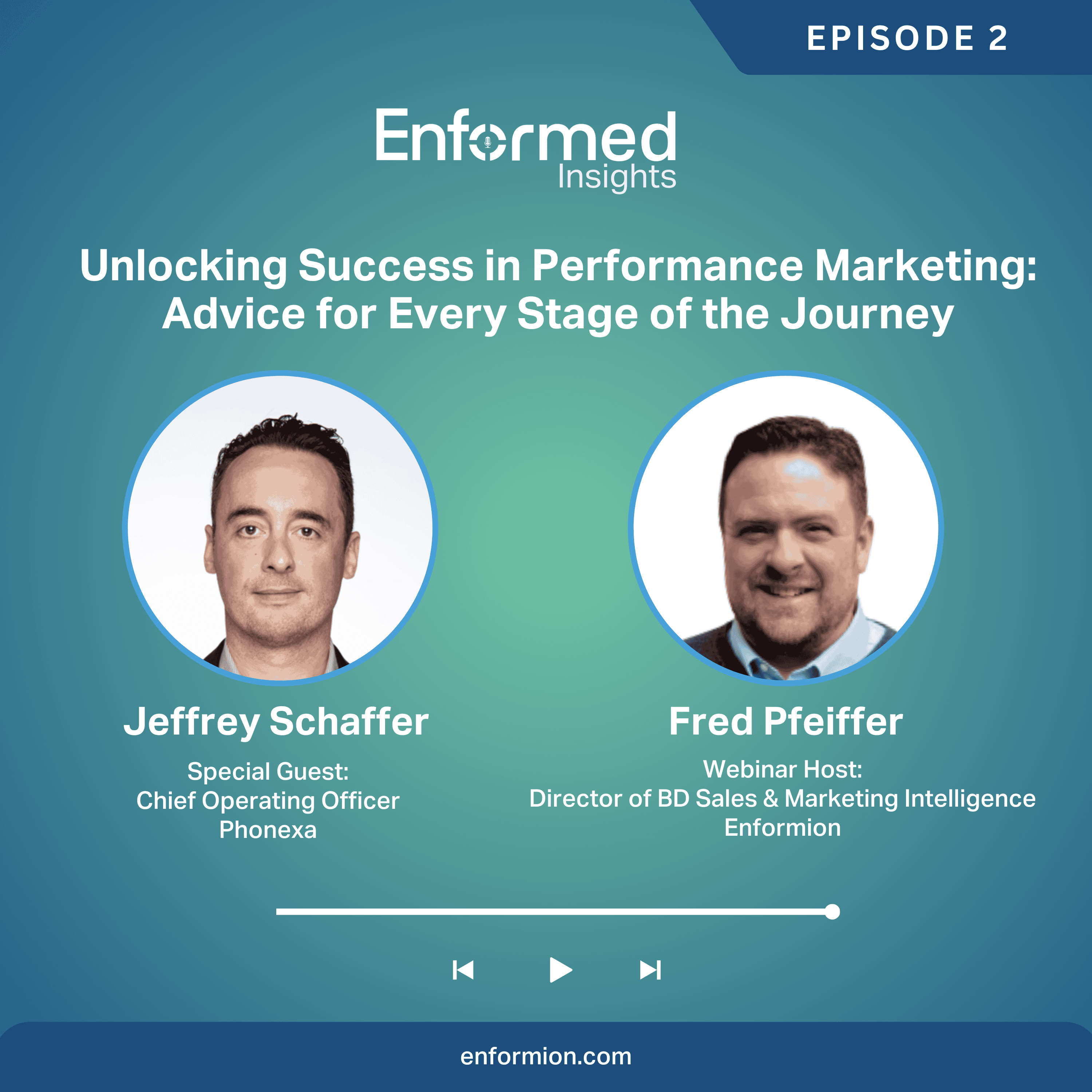Episode 2: Unlocking Success in Performance Marketing – Advice for Every Stage of the Journey


Stream on these platforms:
Click play below to listen:
Join us for another episode of the Enformed Insights podcast, where we interview industry experts and gain personal insights into how they find success in their fields. In our newest episode, we sit down with Phonexa COO, Jeffrey Schaffer, and discuss his journey in performance marketing, and the insights he has gained along the way.
Key Discussion Points:
- Building & Managing High-Performing Teams
- Today’s Performance Marketing Challenges
- How To Meet Evolving Client Needs
- Advice For Industry Professionals
0:02
Welcome to Enformed Insights, the official podcast of Enformion and your guide to the world of public records and data analysis. Join our host, Fred Pfeiffer, as he interviews industry experts and shares practical tips for navigating the future of digital information.
0:11
Today, we have Jeffrey Schaffer, COO of Phonexa.
0:22
Thank you so much for joining the Enformed Insights podcast! How are you doing today?
0:25
Fantastic, Fred! Thanks for having me. Happy to be here.
0:30
We’re so excited to have you on to talk a little bit about you, Phonexa, and the future of consumer data. Let’s start out with a bit on your background and your road to Phonexa.
0:35
Yeah, absolutely. I got into the working world a little bit younger than most. After cutting my teeth in retail sales through my teens, I spent my 20s in various sales roles, predominantly in the financial services space.
0:49
My first real foray into marketing and lead generation happened by accident, like it may have for a lot of folks. I had started an insurance agency and quickly realized that we were a lot better at generating insurance leads than we were at servicing policyholders.
1:01
So, in a matter of months, we evolved from a retail PNC captive insurance agency to a lead and call center selling warm transfers. Fast forward to a two-year period, we grew to having just north of 1,300 agency clients, along with some direct carriers as clients as well.
1:13
I did that for a few years until telemarketing rules changed around 2013. I pivoted and stayed in the financial services sector, moving into a marketing role for a large life and annuity wholesaler for a few years. I learned a lot about recruiting advisors and B2B marketing in that world.
1:50
Eventually, just before COVID, probably for the first time in my life, I had good timing and rejoined an old colleague in his e-commerce agency. Thankfully, I was there right before COVID when everyone had to pivot from relying on traditional brick-and-mortar distribution models to direct-to-consumer, with an emphasis on selling products online.
2:06
I ran the agency for several years through COVID, then found Fexa. They found me, I should say. It was interesting because throughout my career, I’ve been the person companies have utilized to make different bits and pieces of technology, that weren’t made to talk to each other, communicate with each other in order to implement best practices. Phonexa’s all-encompassing performance marketing solution really struck a chord with me.
3:08
What is your approach to building and managing high-performing teams?
3:13
Sure, this ties into core leadership principles. One I can’t take credit for is creating an environment of radical transparency where everyone on the team, from the top down, is open to receiving critical feedback with the end goal of everyone getting better.
3:25
Group mentoring is a huge value. There’s a lot of value in one-on-one coaching, but particularly when building a sales organization or sales team, being able to listen to calls, provide critique in a group setting, and ask others how they might handle a call differently can provide valuable insights.
4:01
Objectivity is hugely important as well. It’s difficult to self-critique and improve if you’re not able to view your performance from an outside perspective.
4:30
Lastly, I’d say creating repeatable processes that take into account the most common variables you’ll encounter. Whether we’re talking about a marketing workflow, sales call, operational processes, or even how you handle reviews and referrals—having a plan for how different situations can go, and training your team to be prepared, is key.
5:14
What advice would you give to someone starting out in the performance marketing industry?
5:21
What’s always interesting to me about this industry is that I’ve never seen such a high percentage of high performers who are so open to listening and sharing their stories. They may not give you a lot of time, but everyone in this space has taken that one cold call or met someone at a show that turned into a great business relationship.
5:44
If you’re new to the industry, don’t be shy. You’ve got to get out there, make the calls, and go to conferences. Understand who you’re competing against, what your value proposition is, and how you’re different, because it’s a very commoditized space.
6:01
Figure out your model in a way that creates a low barrier to entry to build relationships. Make it easy for people to do business with you. Be responsive, streamline the process, and make it simple from a cost and contracting perspective.
6:30
Also, don’t get overly excited just because someone gives you the time of day. Identifying the true potential of a given opportunity early is crucial. You don’t want to end up chasing small opportunities and miss out on bigger ones.
7:01
Lastly, focus on finding and solving problems. If you can open an exploratory dialogue and get someone to share their pain points, solving those problems will build trust and lead to a larger opportunity for further business.
7:53
Can you share a personal story that highlights your passion for the industry?
9:00
Years ago, I remember I was doing marketing for a financial services firm, and one of the hardest-working people there was tasked with recruiting financial advisers. He was very old-school—working with lead cards, just a stack of paper. He resisted implementing any kind of technology in his sales process.
9:53
After months of nudging, we implemented a simple process that funneled leads into his world digitally. It gave him some priority and correlated his cold-calling efforts with the most engaged content.
10:23
It was amazing to see his transformation, going from being resistant to tech to embracing it and seeing real results—better recruiting metrics, less stress, and an easier sales process. I really enjoy making salespeople’s lives easier, especially those who were initially resistant to technology.
11:18
What are Phonexa’s key differentiators in the competitive performance and affiliate marketing software landscape?
11:24
For perspective, Phonexa was born out of the affiliate marketing space, with principles in this industry for over 15 years. Our platform was initially built for one of the US’s largest affiliate networks, and it’s over-engineered for the typical small business. There’s nothing it can’t do that a competitor can do, and we are always building and adding new components to our platform, like lead tracking, call tracking, click tracking, and more.
12:18
Out our new dialer or contact center solution just the next couple months, probably around May of this year.
12:26
We also have the largest development team of any of our competitors, so when we’re getting customer feedback or requests, or “I wish something worked like this,” or “Can you build this?” The answer is very rarely “no.” It’s just a matter of, “Here’s how we’re going to build it.”
12:38
But at the end of the day, you know, we bifurcate our customers into two categories: one being the direct advertisers and two being the whole industry and ecosystem of lead generators and networks to cater to them. Both, particularly the latter, are looking for any competitive edge that they can have.
13:00
So when I say, you know, with no hesitation, we have the most robust reporting and analytics that help our customers make better decisions and automate processes, that’s the key difference. It’s simply a more robust platform than what you’re going to find elsewhere. The all-in-one component is a huge differentiator as well. Instead of having one solution for call tracking and one for web lead tracking, and making all these different technologies try to talk to each other, our customers are able to get a singular view of everything passing through their business, enabling them to make faster decisions based on the all-in-one concept.
13:49
What are the biggest challenges and opportunities facing the performance marketing industry today?
13:54
Well, everybody would think I’m living under a rock if I didn’t at least start off mentioning what’s happening and coming down the pipe with the FCC’s one-to-one consent. There’s a lot of people smarter than me having much longer podcasts about that, so I won’t go too far down that rabbit hole.
14:13
I’ll simply say that as legislation and the economy evolve, personally, I think things are going to get tighter. Margins are likely going to be reduced, CPL (Cost Per Lead) is going to go up, and technology will evolve. We’re in a very agile industry, but there are only so many ways to slice the pie.
14:35
So what I see happening is that as you get minuses in some of these columns, or pluses that could equate to minuses like CPL going up, businesses are going to have to find other areas where they could optimize. Obviously, you can’t go on LinkedIn or read industry publications these days without seeing some new tech vendor leveraging AI, be it for SMS, IVRs, conversational AI, or outbound calling.
15:13
Technologies like that, right now, already have traction, and there’s always a portion of the industry that’s going to be last to adopt and let others make mistakes first, but as things get tighter, businesses will need to look at other areas where they can improve efficiencies. AI is likely going to be at the top of that list.
15:47
As this FCC ruling comes down the pipe and gets implemented, I think you’re going to see a lot of brands, who have historically been reliant on third-party affiliate traffic, deciding to bring things in-house.
16:18
It’s going to be a boon for the agency ecosystem, with a lot of opportunities for digital transformation consulting. And not to state the obvious, but there’s going to be a huge uptick in the appetite for driving inbound costs.
16:41
Can you share some insights into Phonexa’s recent growth and future expansion plans?
16:46
Footprint-wise, we’re at nearly 250 employees. We just opened new offices in Canada in the last handful of months, at a time when a lot of companies in our industry are going more remote. We’re doubling down on our commercial real estate investments. We’ve recently taken up the top three floors of our building in LA, so we are very much in-office. We also have two offices in the UK and are continuing to grow.
17:22
What are the most exciting new features or functionalities Phonexa is currently developing?
17:27
Future state: our contact center solution is going to be a game-changer. I come heavily from a call center background, and I’m personally very excited about it. It’s tough enough when you have eight different platforms, each under their own umbrella. But we are broadening that even more with the launch of this new dialer.
18:00
I’m excited for it because this is the final big puzzle piece to have a truly interconnected, singular operating solution for all things performance marketing.
18:22
Over the last year, we’ve had a huge uptick in the adoption of our fraud detection and prevention tooling. We have a suite within our platform called IC for fraud detection, prevention, data validation, etc. We’re seeing a lot more fraud than we used to, especially with the increase in call fraud associated with media buying.
19:08
How does Phonexa ensure its products are constantly evolving to meet the needs of its clients?
19:14
Step one: you have to talk to your clients. Our leadership team meets constantly, and we take feedback from the smallest to the largest client. It’s distilled, filtered, and presented. I’ve seen us build a feature for a very small client, but because we know it has validity, others are going to use it. That’s how you get better.
20:07
You have to understand what other businesses in different industries are doing. There’s a constant stream of information and input coming to us.
20:41
People really underestimate the value that comes with having a very large top-of-funnel information input into the company. It’s key to have a culture where people collaborate and share what they see, especially when trends emerge.
21:28
Can you share a specific example of how Phonexa has helped a client achieve significant success?
21:36
One example is a network client. In roughly a 12-month period, they used our platform’s traffic flow reports, fraud detection tools, and comparison reports. This led to a 25% increase in revenue and a 30% reduction in lead fraud. Some months they experienced growth of 15-20% month-over-month.
23:00
What are the biggest pain points Phonexa helps clients solve, and how do its solutions address them?
23:12
We cater to a lot of different industries, and part of what makes this company exciting is that it’s rarely the same story. For direct advertisers, the pain points are different from those faced by networks. We provide a suite of solutions that offer great transparency, actionable insights, and help reduce operational loads.
23:59
Being able to future-proof a business with a platform that you won’t outgrow is huge. You never know how your business will evolve in a year, so knowing you have one platform that can scale with you is incredibly important.
25:00
What’s the biggest piece of advice for young people just starting out in business?
25:32
Sales is a great equalizer. Even if you’re not in sales by profession, you’ll be judged on the quality of your verbal communication skills. If that’s a skill you’re good at, get better. If not, you better get better at it, because it will play a large part in how you’re judged in your career.

Ready To Get Started?
Contact us today to request a demo or to get in touch with one of our Data Solution Experts
Talk With Us

